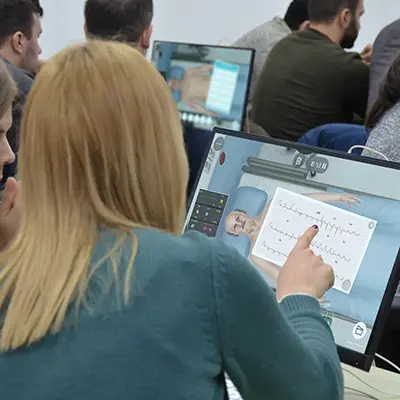Introducing Body Interact’s New CNA Simulations
Exciting News for High School Nursing Educators!
We’re excited to launch Body Interact’s new CNA simulations for high school classrooms, fully aligned with the National Nurse Aide Assessment Program (NNAAP) guidelines. These interactive, hands-on simulations let students step into the role of a CNA and experience real-life healthcare scenarios. Request a live demo today!
CNA programs traditionally rely on a combination of classroom instruction, hands-on clinical practice, and laboratory work to teach essential skills. While effective, this approach has limitations. Real-life clinical experiences can be unpredictable, and students may not encounter every type of patient or situation they need to be prepared for. Healthcare institutions also face challenges like limited availability of clinical sites, patient safety concerns, and an increasing demand for highly skilled CNAs. These issues highlight the need for innovative learning tools like virtual patient simulations to supplement traditional training.
Today’s students are vastly different from those of the past, posing new challenges for nurse educators. Understanding how this modern generation thinks and learns is key, as each student brings a unique approach to learning. While it’s difficult to generalize preferences due to neurodiversity, gaining insights into their mindset and communication style can help develop more effective and engaging teaching methods.
From Critical Thinking to Communication and Empathy
Body Interact is a virtual patient simulator designed to enhance clinical training by providing realistic and dynamic patient scenarios. Unlike static textbook cases, Body Interact presents virtual patients who respond in real-time to CNA interventions.
Students must assess the patient’s condition, make decisions, and observe the outcomes of their actions.

The variety of scenarios and simulation environments allows students to practice a wide range of skills, such as:
Patient assessment
Observing and interpreting vital signs, symptoms, and physical changes.
Critical thinking and decision-making
Making timely decisions based on the patient’s evolving condition encourages proactive decision-making and teaches them how to respond to emergencies or unexpected changes.
Empathy and Communication
Body Interact scenarios often include elements that challenge students to demonstrate empathy and effective communication, which are crucial for CNAs working in long-term care or with vulnerable populations.
Collaboration
Many scenarios require students to act as part of a virtual healthcare team, fostering teamwork and an understanding of their role in a clinical setting.
Discover the new Body Interact CNA Catalog
The new Body Interact CNA Catalog is designed to bring the curriculum to life through realistic, interactive scenarios aligned with the National Nurse Aide Assessment Program (NNAAP). This comprehensive catalog features 50 engaging scenarios, carefully organized into three main sections:
Physical Care Skills
Activities of Daily Living

Physical Care Skills
Basic Nursing Skills

Skills Evaluations

Each section includes hands-on problem-based scenarios covering essential topics such as personal hygiene, therapeutic and technical procedures, and practical tasks like applying knee-high elastic stockings.









